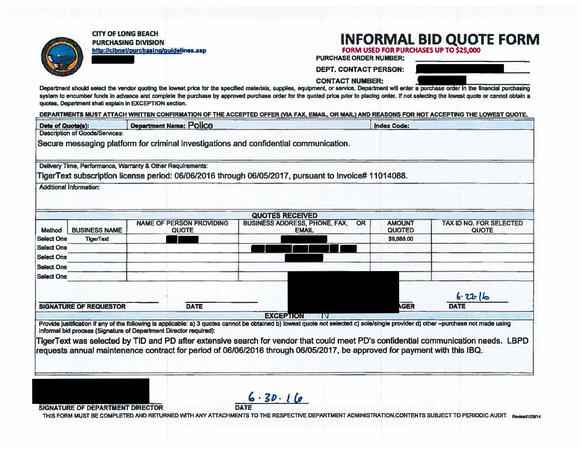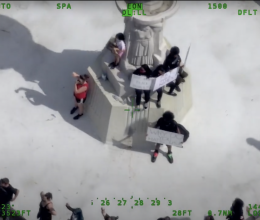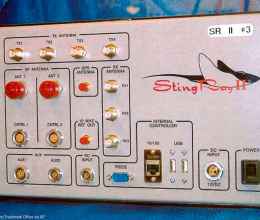In a disturbing trend, government officials and police departments have been thwarting public oversight by using communications apps that automatically delete messages.
The latest example comes from Southern California, where an investigation by Al Jazeera and the ACLU of Southern California revealed last week that the Long Beach Police Department was using an app called TigerText to send self-erasing messages. The department's effort to subvert transparency appears to have been intentional: Supervisors were instructing officers to use the app whenever they wanted to keep potentially damaging information secret — including in cases of police killings.

The LBPD's decision to systematically destroy communications is an outrageous violation of California's public records laws and the legal obligation to preserve records that could come up both in criminal cases and civil rights lawsuits against the department. And this decision — made by the police department in the city ranked the 13th deadliest in the nation for police killing — is also a glaring example of the mindset of impunity that prevails in some police departments.
Sadly, an interlocking web of structural, legal, and political forces has made meaningful accountability for police misconduct a chimera. Government use of disappearing message technologies only presents yet another roadblock on the way to ever being able to police the police.
Californians deserve transparency into police misconduct. Tell Gov. Brown to sign SB 1421.
When police officers kill a member of the public, they receive an immense amount of resources from their local police unions, including rapid legal assistance. Although police departments technically investigate complaints of officer misconduct, the inquiries are often locked away from public view and result in a staggeringly low number of complaints being sustained against an officer. When presented with clear police misconduct, prosecutors often lack the independence or will to charge officers. Legal rules governing how officers may use force allow enormous discretion to kill. And even when internal personnel proceedings occur, they are often unfair and biased in favor of letting even reckless officers keep their jobs. This is all in spite of an avalanche of research showing that the criminal justice system operates in a fundamentally racist fashion.
Government use of disappearing messaging technologies only adds to the problem. When police officers use self-deleting messages, they diminish the public's ability to ever fully know about and challenge the government systems they are subject to. It's only because of a whistleblower that the LBPD scandal ever came to light. After receiving a tip earlier this year, the ACLU filed a public records request seeking information about LBPD's use of TigerText. In response, we received documents confirming that the police department was using the disappearing-message app for “criminal investigations and confidential communication.”
While the LBPD's use of TigerText was kept secret for years, after news of it broke last week, the fallout was swift, reflecting the severity of the scandal. The same afternoon, the department announced that it would suspend use of the application. The ACLU SoCal subsequently sent a letter demanding that the department permanently stop using disappearing-message apps and calling for an investigation into its use of TigerText. The department responded by announcing an independent review by an outside firm, and Los Angeles County prosecutors that handle police misconduct are also investigating.
How Long Beach got to this point provides a compelling reminder of the difficulty of attaining meaningful accountability from the government. While it may come as no surprise that government actors have attempted to hide their operations from public scrutiny throughout history, today, apps like TigerText, Snapchat, Confide, and Wickr take the possibilities to the next level. Through those services, users can set messages to automatically delete after a certain amount of time. The disgraced former governor of Missouri, Eric Greitens, used Confide to trade messages with his staff in violation of public open records laws, resulting in a lawsuit. In 2017, Trump administration officials reportedly downloaded the same application to exchange messages.
As the ACLU explained in a Freedom of Information Act request seeking more information about the use of such applications by federal employees, such apps can help protect privacy and enable free speech when private individuals use them — but when government actors rely on them to conduct government business, it means the public is unlawfully kept in the dark.
The public needs to know how widely police officers use these apps to evade accountability — and we are working to find out. Through our public records request to LBPD, we learned that that department was spending about $10,000 annually for TigerText. Officers from the department said in public statements that they are aware of other departments that use similar technology, though they would not disclose specifics.

Police departments are notoriously secretive about the technologies they purchase and use on the streets, but we hope public records requests will continue to uncover the government's misuse of disappearing-message apps. In the meantime, companies like TigerConnect, the company behind TigerText, should disclose what government agencies they have already sold this feature to, and government actors should discontinue its use. Self-destructing messages have no place in a transparent government.






